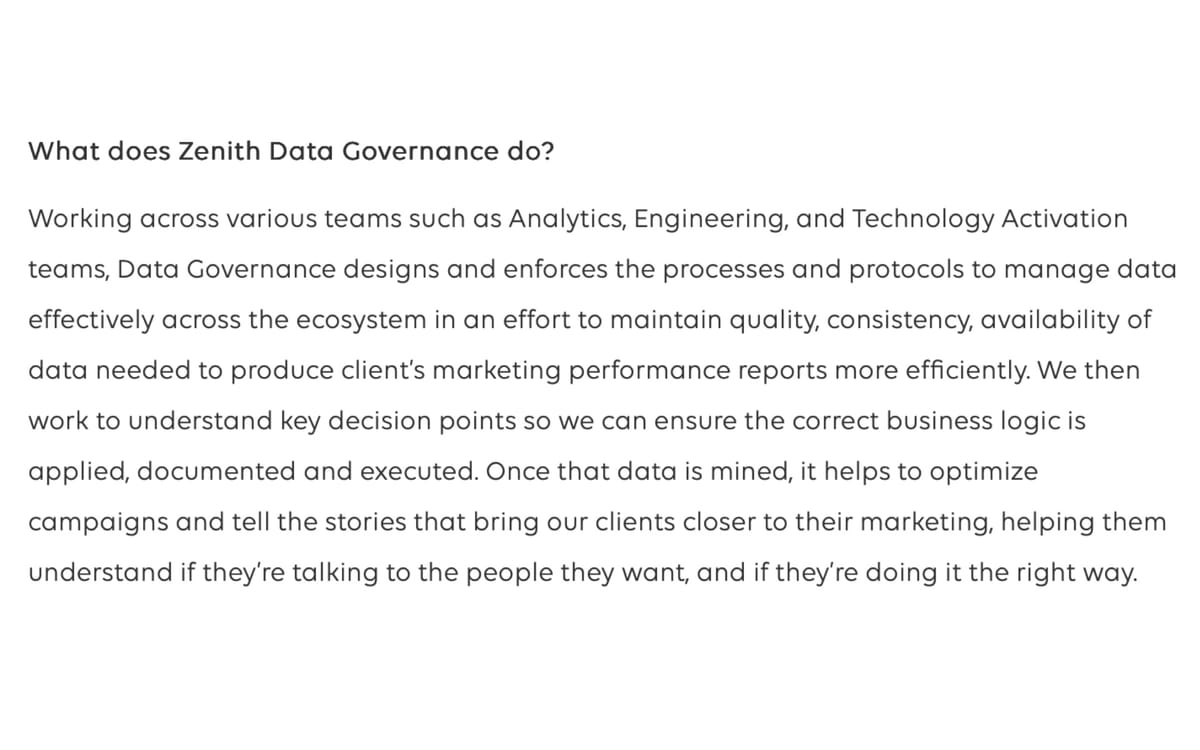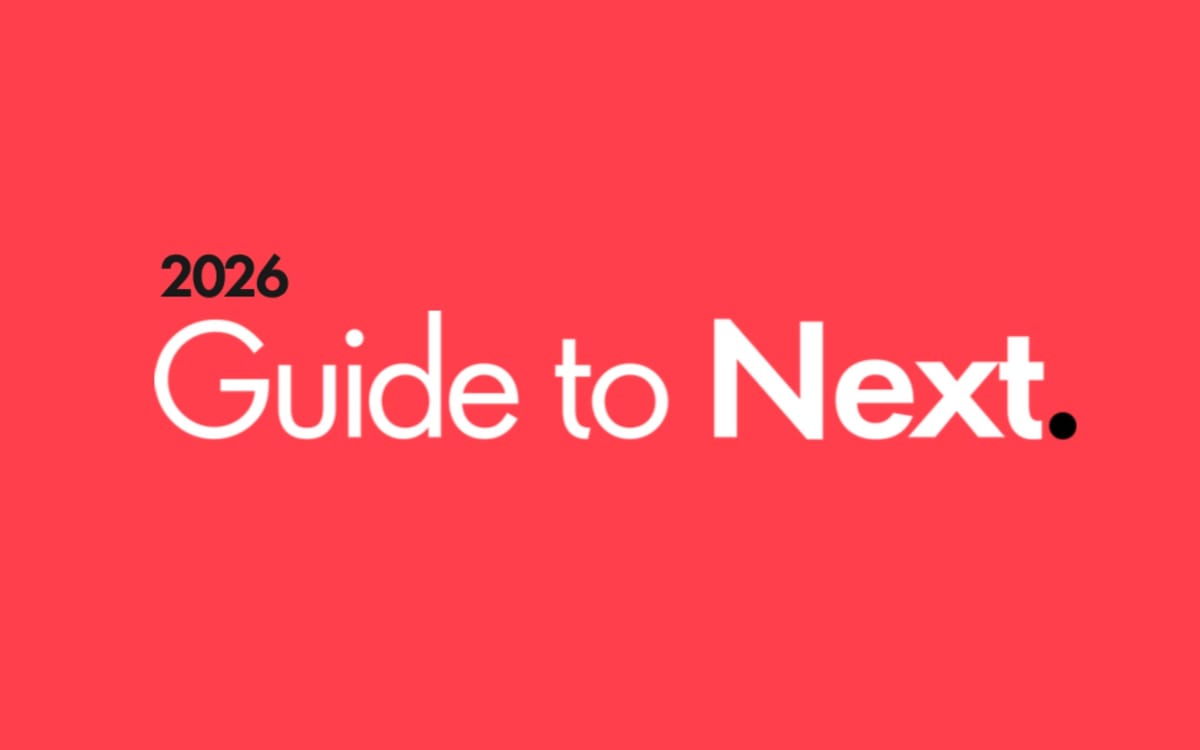
Zenith's Director of Data Governance position, posted on November 6, 2025, reflects a fundamental shift in how media agencies structure their operations. The role requires expertise in digital campaign mechanics, analytics, and regulatory compliance—a combination found primarily among professionals with programmatic advertising backgrounds. Compensation ranges from $120,000 to $157,000 annually for positions in Detroit and New York.
According to the job description, data governance directors design and enforce processes to manage data across agency ecosystems while maintaining quality and consistency for marketing performance reports. The role sits at the intersection of analytics, engineering, and technology activation teams, requiring fluency in both technical implementation and business strategy.
Subscribe PPC Land newsletter ✉️ for similar stories like this one
Programmatic professionals possess exact skills data governance demands
Programmatic advertising professionals possess the specific skill sets agencies need for these positions. Years of managing campaign data flows, tracking pixels, attribution models, and measurement frameworks provide the foundation. These specialists already navigate Google Campaign Manager, Google Analytics, demand-side platforms, and supply-side platforms daily. They understand media taxonomy, cross-channel optimization, and the technical architecture connecting data sources to reporting systems.
The connection runs deeper than surface-level familiarity with advertising technology. Programmatic buyers implement naming conventions across campaigns, validate targeting parameters, ensure frequency caps function correctly, manage publisher exclusion lists, and monitor UTM markup for analytics accuracy. Marketing data governance platforms like Improvado now automate these exact processes—campaign setup validation, targeting accuracy verification, budget alignment checks, and creative configuration monitoring—demonstrating how programmatic operational expertise directly translates to governance responsibilities.
Campaign execution knowledge distinguishes programmatic professionals from traditional data analysts. Understanding data management platforms, demand-side platforms, supply-side platforms, and ad servers means grasping how consumer data flows through auction environments, how bidding algorithms process signals in milliseconds, how attribution windows affect measurement, and how consent management impacts targeting capabilities. This end-to-end comprehension of digital advertising mechanics cannot be taught in classroom settings—it requires hands-on experience troubleshooting campaigns, investigating discrepancies, and ensuring data consistency across fragmented systems.
 PPC LandLuis Rijo
PPC LandLuis Rijo
The technical demands of programmatic trading prepared professionals for governance workflows. Real-time bidding requires understanding how user data gets matched to inventory, how audience segments synchronize across platforms, how frequency capping prevents overexposure, and how conversion tracking attributes outcomes. These same concepts form the core of data governance: maintaining data quality, ensuring consistency, validating business logic, and documenting processes for audit purposes.
Privacy regulations create immediate need for programmatic expertise in governance
The widespread adoption of AI in digital advertising intensifies demand for data governance expertise. IAB Europe reported in September 2025 that 85% of companies deploy AI-based marketing tools, yet only 43% have developed marketing-specific governance frameworks. That gap creates vulnerabilities as agencies scale automated decision-making without proper data quality controls.
Privacy regulations compound the complexity. GDPR enforcement continues intensifying across Europe, with a Madrid court ordering Meta to pay €479 million to Spanish publishers on November 19, 2025, for behavioral advertising violations between 2018 and 2023. Similar regulatory pressure affects every digital marketing operation processing personal data.
Google's Restricted Data Processing mode expansions demonstrate the operational impact. The company activated privacy controls for Delaware and Oregon on November 17, 2025, following earlier implementations across eight states. Publishers using Google AdSense experience automatic compliance through Global Privacy Control signals, restricting persistent identifiers and limiting data sharing with demand-side platforms.
Programmatic professionals navigate these privacy frameworks daily. They understand how consent management platforms integrate with bid streams, how privacy signals affect auction participation, how data clean rooms enable collaboration without exposing raw data, and how contextual targeting replaces behavioral approaches. Managing privacy compliance while maintaining campaign effectiveness requires balancing legal requirements with business objectives—exactly what data governance roles demand.
The cookie deprecation timeline, repeatedly delayed but inevitable, forces agencies to restructure data strategies. First-party data collection, clean room partnerships, and alternative identifiers like RampID and UID 2.0 replace third-party cookies. Programmatic professionals already implement these solutions, understanding both the technical mechanisms and the strategic implications for campaign execution.
Buy ads on PPC Land. PPC Land has standard and native ad formats via major DSPs and ad platforms like Google Ads. Via an auction CPM, you can reach industry professionals.
Campaign data management translates directly to governance frameworks
Zenith's requirements illuminate why programmatic professionals fit these roles. The position demands six years of media experience with three in management, extensive knowledge of digital channels, and advanced Excel skills for working with large datasets. Candidates must understand Media Tools, Media Ocean, and multiple measurement vendors—exactly the platforms programmatic specialists use for campaign trafficking and optimization.
The role's responsibilities extend beyond technical proficiency. Directors behave like business analysts who translate client requirements into clear documentation facilitating automation. They design standardized processes enabling efficient data management while ensuring correct business logic gets applied and executed. According to Comscore data released January 21, 2025, 72% of marketers plan to increase their programmatic advertising investment in 2025, marking a significant rise from 62% in 2024, creating more data governance challenges as automated trading scales.
MiQ's acquisition of Grasp on November 7, 2023, highlighted the commercial value of data governance technology. Grasp's SaaS suite prevents non-compliances and enforces governance frameworks before campaign launch, eliminating manual errors that cost advertisers millions in lost revenue. That acquisition demonstrated how programmatic trading companies recognize governance as competitive advantage rather than compliance overhead.
The IAB Tech Lab's Agentic RTB Framework, released for public comment on November 12, 2025, establishes standardized specifications for deploying containerized agents within real-time bidding infrastructure. As AI agents automate programmatic advertising tasks, governance becomes essential. Without proper frameworks, automation risks repeating transparency problems that plagued programmatic's early years—opaque supply chains, brittle data, uneven governance amplified at machine velocity.
Data governance market growth creates sustained demand for specialized talent
The data governance market projects explosive expansion from $3.35 billion in 2023 to $7.5 billion by 2033, representing 15.5% compound annual growth rate. Alternative projections estimate growth to $13.92 billion by 2031 at 19.7% CAGR. This expansion directly drives demand for data governance professionals as agencies build compliance frameworks for privacy regulations.
Over 80% of agencies underwent organizational restructuring in 2024 due to privacy legislation and signal loss, according to IAB State of Data 2024. Companies invested heavily in training staff on data privacy (78%), creating teams dedicated to business transformation, and hiring external expertise. This reflected a shift from reactive compliance to proactive privacy-by-design approaches.
Chief Privacy Officer roles expanded to include data governance, AI governance, and ethics oversight, while other C-suite positions like Chief Information Security Officer and Chief Data Officer acquired prominent data responsibilities. The magnitude of regulatory risks drives these changes in organizational structure, with privacy functions expanding beyond compliance to strategic enablement.
Technical requirements favor programmatic specialists. Zenith seeks professionals with experience managing and querying relational databases, understanding cloud computing environments like AWS and Azure, and knowledge of Python or other data manipulation languages. These capabilities align directly with skills programmatic professionals develop while building campaign data pipelines and reporting automation.
The position requires subject matter expertise in search, display banners, email, contextual advertising, and social channels. Programmatic buyers already possess this cross-channel fluency. They understand how different inventory types generate distinct data structures, how attribution windows affect measurement, and how audience segments flow between data management platforms and activation systems.
Sign up for the free weekly newsletter
Your go-to source for digital marketing news.
No spam. Unsubscribe anytime.
Industry consolidation and AI integration intensify talent competition
Industry adoption patterns suggest governance challenges will intensify. The Ad Context Protocol launched October 15, 2025, aims to enable AI agents to automate programmatic advertising tasks. Without proper governance frameworks, such automation risks repeating the transparency problems that created today's dysfunctional supply chain, according to David Kohl, a growth and transformation leader who criticized the protocol's premature launch.
Amazon launched agentic capabilities across its advertising platform on November 11, 2025, transforming tools from question-answering systems into autonomous agents that monitor accounts, optimize inventory, and manage campaigns. The system processes natural language instructions to execute complex workflows including campaign creation, audience targeting, and analytics query generation. As automation scales, governance becomes non-negotiable.
The convergence of AI-driven personalization, generative AI for content creation, and advanced privacy-conscious functionalities transforms digital marketing in 2025. These advancements aim to make campaigns more tailored and effective while complying with evolving data privacy rules. Programmatic professionals who understand both the technical mechanisms and regulatory implications position themselves perfectly for governance leadership.
Retail media networks experienced explosive growth, reaching $53.7 billion in 2024 with 23% growth, projected to leap another 29.3% in 2025. By 2026, retail media network spending is forecast to exceed $30 billion, representing nearly 16% of all programmatic display. This surge creates demand for professionals understanding retail media measurement, commerce analytics, and in-store/online attribution—skills programmatic specialists already possess.
Media agencies face particular pressure as clients demand both performance optimization and regulatory compliance. The European Data Protection Board's guidelines adopted September 11, 2025, establish how marketers must navigate the intersection between the Digital Services Act and GDPR. Advertising transparency obligations require platforms to provide real-time information about advertisement parameters while GDPR mandates prior disclosure before data collection begins.
Career transition paths favor programmatic specialists entering governance
For programmatic professionals considering career transitions, data governance roles offer several advantages. The work remains technically challenging while moving upstream from campaign execution to strategic infrastructure. Client interaction increases as directors present insights and recommendations rather than implementation updates. Career progression paths extend through vice president positions overseeing multiple teams and accounts.
The timing favors programmatic professionals entering this field. Demand outpaces supply as agencies scramble to build governance capabilities. Professionals who transition now gain first-mover advantages, establishing themselves as subject matter experts before the labor market balances. Their campaign execution experience provides credibility when designing governance processes, as they understand practical implementation constraints rather than theoretical compliance requirements.
Technical debt accumulated over years of programmatic advertising expansion creates immediate work. Legacy data pipelines require documentation, standardization, and modernization. Measurement methodologies need reconciliation across platforms. Attribution models demand validation against actual conversion data. Consent management systems must integrate with campaign activation platforms. These projects require someone who understands both the current state and desired future state—exactly what programmatic specialists bring.
The position serves as a bridge between technical execution and business strategy. Directors translate between engineering teams building data infrastructure and clients demanding actionable insights. They explain technical limitations to stakeholders while advocating for client needs to development teams. This mediating role suits professionals who understand campaign mechanics deeply enough to evaluate technical trade-offs while maintaining focus on business objectives.
Comprehensive data governance frameworks establish policies for access control, data quality standards, privacy compliance, retention timelines, and encryption protocols. Programmatic professionals already implement these practices informally through campaign management—now governance roles formalize and scale these capabilities across entire organizations, protecting agencies from compliance failures while enabling competitive advantages through superior data management.
Subscribe PPC Land newsletter ✉️ for similar stories like this one
Timeline
- November 7, 2023: MiQ acquires Grasp, highlighting commercial value of media governance and data quality platforms
- February 17, 2024: Industry report shows 62% of advertisers plan to increase programmatic investment despite cookie deprecation challenges
- September 14, 2024: Proximic reveals 88% of advertisers expect significant privacy law impact, with data governance emerging as critical capability
- January 21, 2025: 72% of marketers plan to increase programmatic advertising investment in 2025, up from 62% in 2024, creating additional data management complexity at scale
- February 12, 2025: Italian media platform Piemme implements dual identity technology demonstrating need for governance frameworks managing multiple data sources
- July 14, 2025: Index Exchange invests in First Party Capital, signaling industry focus on data infrastructure improvements
- September 11, 2025: European Data Protection Board clarifies DSA compliance, establishing dual regulatory framework requirements
- September 18, 2025: IAB Europe reports 85% AI adoption yet only 43% have marketing-specific governance frameworks
- October 15, 2025: Ad Context Protocol launches amid warnings about building automation without governance foundations
- November 6, 2025: Zenith posts Director of Data Governance position reflecting agency talent needs
- November 11, 2025: Amazon launches agentic advertising capabilities requiring robust governance oversight
- November 12, 2025: IAB Tech Lab releases Agentic RTB Framework establishing standards for AI agent deployment
- November 17, 2025: Google activates privacy controls for Delaware and Oregon, demonstrating ongoing regulatory expansion
- November 19, 2025: Madrid court orders Meta to pay €479 million for GDPR violations, emphasizing compliance stakes
Subscribe PPC Land newsletter ✉️ for similar stories like this one
Summary
Who: Zenith, part of Publicis Media, seeks Director of Data Governance professionals with programmatic advertising backgrounds. The role targets candidates with six years of media experience, three in management, who understand digital campaign mechanics, analytics platforms, and regulatory compliance frameworks.
What: Data governance directors design and enforce processes managing data across agency ecosystems while maintaining quality and consistency for marketing performance reports. Responsibilities include translating client requirements into technical documentation, standardizing data management procedures, ensuring correct business logic application, and representing governance teams to clients. The position requires expertise in Google Campaign Manager, Google Analytics, media planning platforms, measurement vendors, and database management.
When: Zenith posted the position on November 6, 2025, with an application deadline of December 23, 2025. The timing coincides with accelerating privacy regulations, AI adoption reaching 85% across European digital advertising, and 72% of marketers planning to increase programmatic investment in 2025 according to industry data.
Where: Positions are available in Detroit, Michigan, and New York, New York, with hybrid workplace arrangements. The governance challenges extend across global markets as agencies manage campaigns subject to GDPR, state privacy laws, and platform-specific data restrictions affecting operations worldwide.
Why: Privacy regulations, AI automation, and programmatic advertising scale create unprecedented data governance demands. Agencies lack sufficient specialists who understand campaign execution mechanics, regulatory requirements, and technical infrastructure simultaneously. Programmatic professionals possess this combination through hands-on experience managing data flows, tracking implementations, attribution systems, and measurement frameworks that governance roles formalize and expand. The commercial stakes increased as enforcement intensified, with Meta's €479 million penalty and expanding US state privacy laws demonstrating compliance importance.

